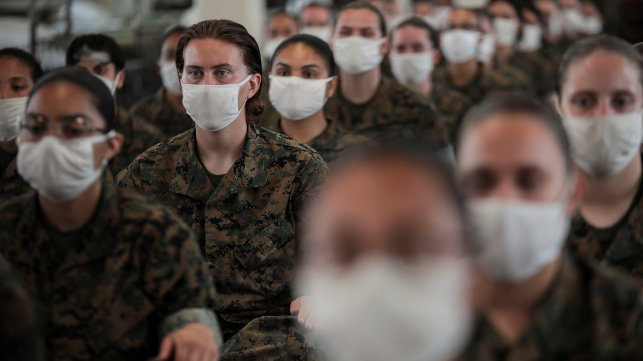U.S. Navy Study: Quarantine is No Guarantee Against COVID's Spread

A new U.S. Navy study published last week in the New England Journal of Medicine identified serious challenges for COVID-19 control in group living environments like warships, merchant vessels, prisons and dormitories. Most vessels in the U.S. Navy's fleet (including vessels in port or shipyard) have experienced at least one case of COVID-19 since the pandemic began, despite stringent preventive measures, and COVID outbreaks have occurred regularly aboard merchant vessels and cruise ships as well.
In the study, scientists from the Naval Medical Research Center and the Icahn School of Medicine at Mount Sinai followed a cohort of nearly 2,000 new Marine Corps recruits as they passed through a carefully controlled induction process on the campus of The Citadel in South Carolina. The data showed asymptomatic spread of the virus even under strict military control, despite higher personal compliance with preventive measures than would be possible in most civilian settings.
The researchers found that daily temperature and symptom checks did not detect infections; that few infected recruits had symptoms before diagnosis; that transmission occurred despite implementing many best-practice public health measures; and that diagnoses were made only by scheduled tests - not by reactive testing performed in response to identified symptoms.
The participants were offered the chance to enroll in the study after a two-week, in-home self-quarantine. Once they arrived at the basic training site, they were assigned to two-person dorm rooms and held to strict supervised quarantine measures (like mask-wearing, social distancing and regular handwashing). Each recruit class of 350-450 people was housed in a different building, with different training and dining schedules in order to prevent interaction between groups. The classes were further subdivided into 50-60 recruit platoons.
To determine the extent of COVID-19's presence and spread within this highly-controlled environment, all participants were tested three times: first within two days of arrival, again at seven days, and once more at 14 days. Testing showed that pre-arrival quarantine did not keep the virus out, and standard preventive measures did not halt its spread. Over the course of the experiment, 51 recruits tested positive, including 46 who reported no symptoms. RNA analysis of the samples from infected recruits identified six groups of people who shared the same mutation of the virus, showing that local transmission occurred during the quarantine period. These clusters centered on roommates and platoon groups.
"The identification of six independent transmission clusters . . . indicates that there were multiple independent SARS-CoV-2 introductions and outbreaks during the supervised quarantine," said Harm van Bakel, PhD, assistant professor of genetics at the Icahn School. "The data from this large study indicates that in order to curtail coronavirus transmission in group settings and prevent spill-over to the wider community, we need to establish widespread initial and repeated surveillance testing of all individuals regardless of symptoms."
